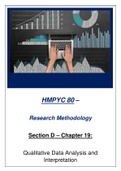HMPYC 80 –
Research Methodology
Section D – Chapter 19:
Qualitative Data Analysis and
Interpretation
, 1. Introduction:
► The purpose of conducting a qualitative study is to generate findings.
- This involves reducing the volume of raw information, shifting significance from trivia,
identifying significant patterns and constructing a framework for communicating the
essence of what the data reveals.
► Data analysis is the process of bringing order, structure and meaning to the data collected.
- In reality, qualitative data analysis is messy, ambiguous and time-consuming, but it is also
a creative and fascinating process.
► Data analysis is closely intertwined with the research design, data collection, analysis,
presentation and dissemination.
- it does not proceed in a linear fashion; It is an iterative process.
- Data interpretation drives the decisions regarding data collection.
► The rapid developments in qualitative data analysis and interpretation align with the
significant changes in qualitative design.
► Traditional ways of gathering data, such as interviewing, participants observation and
document study, are all complemented by new diverse types of data, including visual,
virtual, textual and audiovisual.
2. Characteristics of Qualitative
Data Analysis:
► Qualitative inquiry can be placed on a continuum ranging from a more narrowly defined
positivist approach to a broad, post positivist, humanistic, interpretative, post-modern and
critical conception.
► Ontological and epistemological assumptions have broadened qualitative inquiry to include
narratives, photography and drama or poetry with multiple truths and novel vocabulary.
► The core similarities and differences between qualitative and quantitative analysis or
pinpointed as follows:
1) Both infer from data to abstract ideas, but quantitative researchers choose from a
specialized, standard set of data analysis techniques, while qualitative data analysis
is less standardized with the wide variety in strategies to qualitative research
matched by the many techniques for data analysis.
2) Both use a robust process described in detail, but qualitative data analysis begins
with data collection and is therefore a less distinct final stage of the research process
than qualitative analysis, where data analysis does not begin until all data have been
collected and condensed into numbers.
, 3) Both make comparisons, but qualitative researchers create new concepts and theory
by blending together data and abstract concepts, whereas quantitative researchers
test pre-existing theories and hypotheses.
4) Both avoid false conclusions, but qualitative data are in the form of words, which are
contextually based, whereas quantitative researchers use precise language of
statistical relationships and effect size.
► It is clear that quantitative researchers explain human behavior by means of objectivistic
observation and the use of general scientific laws.
- Conversely, qualitative researchers believe that human behavior can only be understood
from a subjective point of view by gaining insights into the meaning that the participants
gave to their lifeworld.
► Striving to meet the measures set by traditionally dominating quantitative research, various
scholars attempted to develop criteria for trustworthiness after Guba and Lincoln who
originally introduced 4 dimensions for assessing the quality of qualitative research, namely:
1) Credibility.
2) Dependability.
3) Confirmability.
4) Transferability.
3. Enhancing the Quality of
Qualitative Research:
3.1. Criteria for Assessing Quality:
► The concepts of transferability, dependability, confirmability and credibility, as
dimensions as dimensions of credible qualitative research, are widely regarded as
important measures of trustworthiness.
A. Transferability:
► (Alternative to external validity).
► Transferability of research findings refers to the extent to which a stu dy's findings can be
applied in other contexts and studies.
- As the alternative to external validity or generalizability in quantitative studies, in
qualitative research you ask whether the findings of the research can be transferred from a
specific situation or case to another.
► Transferability should not be confused with generalization, as it is against the very nature of
contextualized, qualitative studies to be generalized.
► Transferability refers to the importance of building discipline, reflexivity, rigor and reliability
into the process of inquiry itself so that enables the use of the study in other settings.





